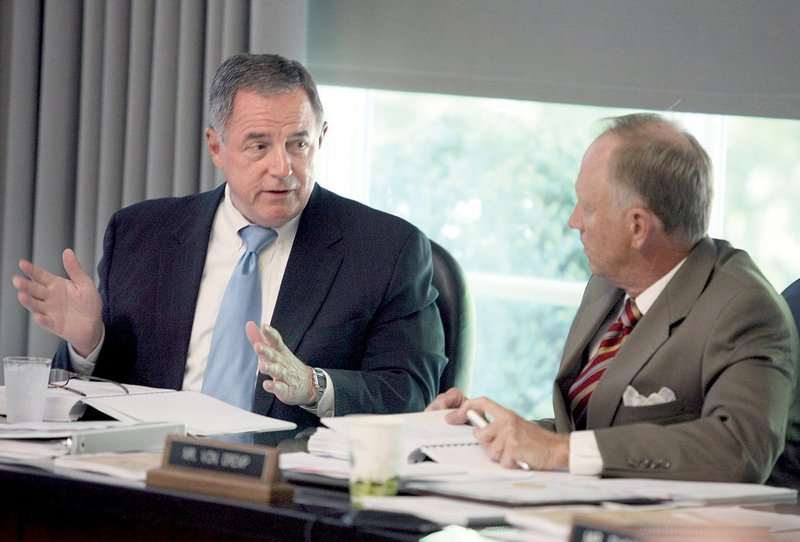LITTLE ROCK — University of Arkansas students at the system’s 12 campuses will see larger tuition and mandatory fee bills next fall after the University of Arkansas System board of trustees approved the increases in a 9-1 vote Friday.
Undergraduates at the University of Arkansas at Fayetteville, the state’s largest university, will pay $6,767 a year in tuition and fees during the 2010-11 academic year, up 4.77 percent over 2009-10. University of Arkansas at Little Rock students will pay $6,376, up 4.99 percent overlast year.
The largest increase was at the University of Arkansas at Fort Smith, where students will pay $4,918 a year, up 6.91 percent from the previous year.
Figures are based on instate students taking 30 credithours a year.
University officials said the increases were necessary because of the growing student population and higher energy and health insurance bills, combined with no projected growth in state funding.
But some trustees and students voiced concerns that rising prices will eventually put higher education out of reach for some.
Sam Hilburn of Little Rock was the sole trustee to vote against the increase. He said he couldn’t stomach taking more money from students in the current economic climate, when so many Arkansas families are struggling.
“I have real reservations about voting for an increase at this time because everybody’s suffering,” Hilburn said. “Times are tough ... People are hurting out there right now.”
UA System President B. Alan Sugg said the system was hit with $8.5 million in state budget cuts last fall, while enrollment grew by about 3,800 students statewide. Even so, Arkansas fared better than some states where universities implemented double-digit tuition increases, he said.
“Any tuition increase is too much, but at the same time, our state is a lot better off [than some],” Sugg said.
Tuition and fees at the University of Arkansas at Pine Bluff will go up 4.93 percent to $5,033 per year. Students at the University of Arkansas at Monticello will see an increase of about 5 percent to $4,990 per year.
Cheryl Chapman is a junior studying early childhood education at the University of Arkansas at Fort Smith. She’s paying for college with the help of state and federal grants, student loans and a part-time job she works in addition to her full course load.
With the increases, her grant money won’t go as far, and she’ll have to pay the difference, she said.
“That could make it slightly more difficult for me,” Chapman said. “For students that do not receive any assistance, this could mean that they might not be able to attend college at all.”
Chapman said she’s hopeful the lottery scholarships will help ease the burden for students like herself.
Approved by voters in 2008, the Arkansas Scholarship Lottery is expected to generate $104.9 million for scholarships for the fiscal year beginning July 1. Individual scholarships for those who qualify will be$5,000 per year for four-year university students and $2,500 per year for two-year college students.
Jennifer Sue Everett-Ellis is a sophomore majoring in journalism at UALR. She said she’s a nontraditional student who returned to college after a 10-year break. Her husband is also a UALR student and works at the University of Arkansas for Medical Sciences, so they get a tuition break. But the couple make too much to qualify for federal Pell Grants. They’re paying their way with student loans.
Everett-Ellis said tuition increases are to be expected.
“No one likes a tuition increase, but unfortunately that is the reality of the world we live in,” she said. “Collegeshave to keep up with increasing technology and new information to produce quality graduates, and that takes money.
“I want an education I can afford, but at the same time I need one that will prepare me well for the future.”
Christopher D. Smith is president of UALR’s Student Government Association and a senior majoring in political science. He said he also understands why the increases are necessary.
“Other institutions around the state and the country are having to do the same thing, too. Seeing that, I understand that UALR is trying to better the education for the students here.
“As long as the burden isnot too hard to bear, students will be willing to accept the change and continue their education.”
According to Trends in College Pricing, an annual report published by the nonprofit College Board, published tuition and fees at public fouryear colleges and universities rose an average of 4.9 percent beyond general inflation each year between 1999 and last fall.
Nationwide, in-state tuition and fees at public four-year universities averaged $7,020 last fall, up $429, or 6.5 percent, from the previous year. Tuition and fees at public twoyear colleges averaged $2,544 last fall, which is $172, or 7.3 percent, higher than the year before.
UA trustee Carl Johnson of Little Rock expressed concern about continuing to raise the cost of college “on the backs of students.” Too many students are scraping by as it is, he said.
“Tuition is going to get to a point where poor people are not going to be able to go there, and that’s not the university I want for my state,” Johnson said.
Johnson said he would like to see more scholarship money given out based on financial need, instead of merit-based scholarships that too often go to students of high-income families.
UA trustee Jim von Gremp of Rogers said Arkansas colleges and universities need to get more state funding.
“The simple fact is that long term, over the next 10-15 years, if we don’t find a better way to get more state support for higher education, we are going to continue to have tuition increases, whether we like it or not,” von Gremp said.
Front Section, Pages 1 on 04/17/2010
